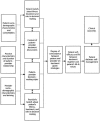When do patients and their physicians agree on diabetes treatment goals and strategies, and what difference does it make?
- PMID: 14687274
- PMCID: PMC1494939
- DOI: 10.1046/j.1525-1497.2003.21132.x
When do patients and their physicians agree on diabetes treatment goals and strategies, and what difference does it make?
Abstract
Background: For patients with chronic illnesses, it is hypothesized that effective patient-provider collaboration contributes to improved patient self-care by promoting greater agreement on patient-specific treatment goals and strategies. However, this hypothesis has not been tested in actual encounters of patients with their own physicians.
Objective: To assess the extent to which patients with type 2 diabetes agree with their primary care providers (PCPs) on diabetes treatment goals and strategies, the factors that predict agreement, and whether greater agreement is associated with better patient self-management of diabetes.
Design: One hundred twenty-seven pairs of patients and their PCPs in two health systems were surveyed about their top 3 diabetes treatment goals (desired outcomes) and strategies to meet those goals. Using several measures to evaluate agreement, we explored whether patient characteristics, such as education and attitudes toward treatment, and patient-provider interaction styles, such as shared decision making, were associated with greater agreement on treatment goals and strategies. We then examined whether agreement was associated with higher patient assessments of their diabetes care self-efficacy and self-management.
Results: Overall, agreement on top treatment goals and strategies was low (all kappa were less than 0.40). In multivariable analyses, however, patients with more education, greater belief in the efficacy of their diabetes treatment, and who shared in treatment decision making with their providers were more likely to agree with their providers on treatment goals or strategies. Similarly, physician reports of having discussed more content areas of diabetes self-care were associated with greater agreement on treatment strategies. In turn, greater agreement on treatment goals and strategies was associated both with higher patient diabetes care self-efficacy and assessments of their diabetes self-management.
Conclusion: Although patients and their PCPs in general had poor agreement on goals and strategies for managing diabetes, agreement was associated with higher patient self-efficacy and assessments of their diabetes self-management. This supports the hypothesis that enhancing patient-provider agreement on both overall treatment goals and specific strategies to meet these goals may lead to improved patient outcomes.
Figures
Similar articles
-
Training Primary Care Physicians to Employ Self-Efficacy-Enhancing Interviewing Techniques: Randomized Controlled Trial of a Standardized Patient Intervention.J Gen Intern Med. 2016 Jul;31(7):716-22. doi: 10.1007/s11606-016-3644-z. Epub 2016 Mar 8. J Gen Intern Med. 2016. PMID: 26956140 Free PMC article. Clinical Trial.
-
A qualitative study of perceived responsibility and self-blame in type 2 diabetes: reflections of physicians and patients.J Gen Intern Med. 2012 Sep;27(9):1180-7. doi: 10.1007/s11606-012-2070-0. Epub 2012 May 2. J Gen Intern Med. 2012. PMID: 22549299 Free PMC article.
-
The relative importance of physician communication, participatory decision making, and patient understanding in diabetes self-management.J Gen Intern Med. 2002 Apr;17(4):243-52. doi: 10.1046/j.1525-1497.2002.10905.x. J Gen Intern Med. 2002. PMID: 11972720 Free PMC article.
-
Are provider self-efficacy and attitudes related to cardiovascular prevention associated with better treatment outcomes?Transl Res. 2007 Apr;149(4):165-72. doi: 10.1016/j.trsl.2006.12.006. Transl Res. 2007. PMID: 17383590 Review.
-
[Diabetes - therapeutic goals in old age].MMW Fortschr Med. 2025 May;167(8):36-39. doi: 10.1007/s15006-025-4867-x. MMW Fortschr Med. 2025. PMID: 40312640 Review. German. No abstract available.
Cited by
-
An exploratory typology of provider responses that encourage and discourage conversation about complementary and integrative medicine during routine oncology visits.Patient Educ Couns. 2015 Jul;98(7):857-63. doi: 10.1016/j.pec.2015.02.018. Epub 2015 Mar 14. Patient Educ Couns. 2015. PMID: 25865412 Free PMC article.
-
Deprescribing medication in very elderly patients with multimorbidity: the view of Dutch GPs. A qualitative study.BMC Fam Pract. 2012 Jul 9;13:56. doi: 10.1186/1471-2296-13-56. BMC Fam Pract. 2012. PMID: 22697490 Free PMC article.
-
Patient-provider concordance in the prioritization of health conditions among hypertensive diabetes patients.J Gen Intern Med. 2010 May;25(5):408-14. doi: 10.1007/s11606-009-1232-1. Epub 2010 Feb 2. J Gen Intern Med. 2010. PMID: 20127197 Free PMC article.
-
Culturally tailoring patient education and communication skills training to empower African-Americans with diabetes.Transl Behav Med. 2012 Sep;2(3):296-308. doi: 10.1007/s13142-012-0125-8. Transl Behav Med. 2012. PMID: 24073128 Free PMC article.
-
The Association of Patient Chronic Disease Burden and Self-Management Requirements With Shared Decision Making in Primary Care Visits.Health Serv Res Manag Epidemiol. 2014 Jan;1:2333392814538775. doi: 10.1177/2333392814538775. Epub 2014 Jun 17. Health Serv Res Manag Epidemiol. 2014. PMID: 26640812 Free PMC article.
References
-
- Bandura A. Englewood Cliffs, NJ: Prentice Hall; 1986. Social Foundations of Thought and Action. A Social Cognitive Theory.
-
- Williams GC, Freedman ZR, Deci EL. Supporting autonomy to motivate patients with diabetes for glucose control. Diabetes Care. 1998;21:1644–51. - PubMed
-
- Heisler M, Smith DM, Hayward RA, Krein SL, Kerr EA. How well do patients' assessments of their diabetes self-management correlate with actual glycemic control and receipt of recommended diabetes services? Diabetes Care. 2003;26:738–43. - PubMed
-
- DiMatteo MR. Enhancing patient adherence to medical recommendations. JAMA. 1994;271:83. - PubMed
Publication types
MeSH terms
Grants and funding
LinkOut - more resources
Full Text Sources
Medical


